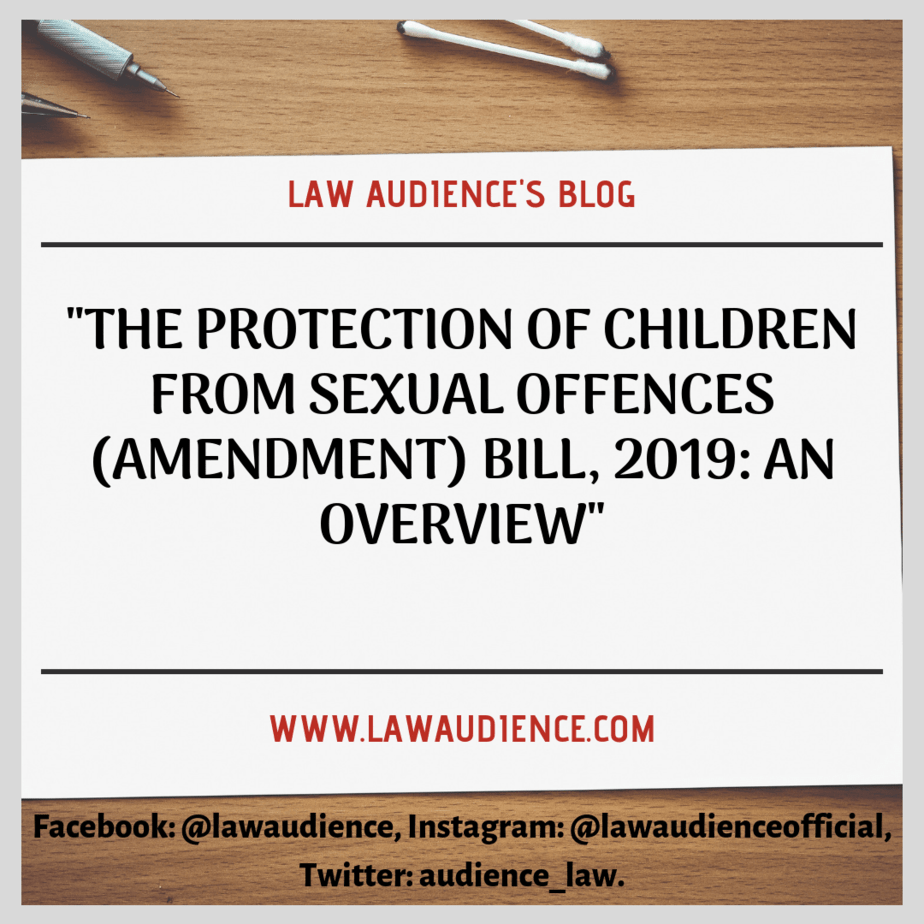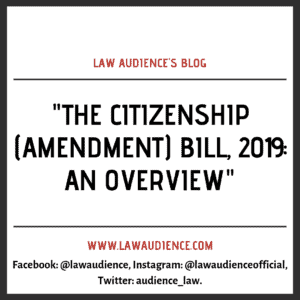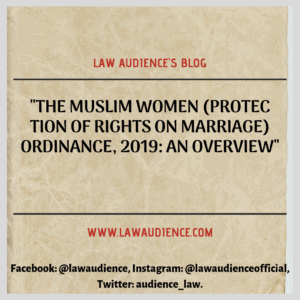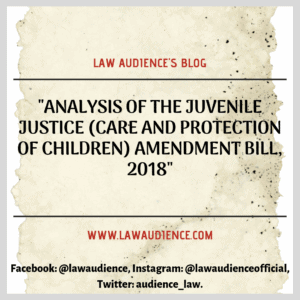AUTHORED BY: MR. AVINASH PANDEY, B.B.A.LL.B, 2ND YEAR STUDENT AT IFIM LAW COLLEGE & RESEARCH WRITER AT LAW AUDIENCE.
I. INTRODUCTION:
The Protection of Children from Sexual Offences (POCSO) was introduced in the year 2011, came into the force on 22 May 2012. The laws formed by the government in following with the law have also been announced in November 2012 and the rule has become available for the implementation.
The Protection of Children from Sexual Offences (Amendment) Bill, 2019, was introduced in the Lok Sabha as on 9th of January 2019 and it is yet to be passed by the Lok Sabha. There have been many proposals for extra acrimonious laws. Certain alterations were recognised by the Ministry of Women and Child Development. This bill was framed by the respective ministry for the legal structure for the camouflage of children from misdemeanours of intimate attack, sexual harassment and vulgarity while safeguarding the concern of the child at every platform of the administrative process.
II. EXTENT & OBJECT:
- This Act may be called the Protection of Children from Sexual Offences (Amendment) Act, 2019.
- It shall come into force on such date as the Central Government may, by notification in the Official Gazette, appoint.
- It shall be applicable to the whole of India, excluding the State of Jammu and Kashmir.
III. REASONS BEHIND THE INTRODUCTION OF THE 2019 BILL:
The main reason behind the introduction of The Protection of Children from Sexual Offences (Amendment) Bill, 2019, is to amend the Principal Act, i.e., The Protection of Children from Sexual Offences Act, 2012.
As we all know that the most meaningful reason behind the enlightenment of the Principal Act, i.e., POCSO Act, 2012, was to come up with some stringent law for the juveniles in order to prevent all the crimes from which the juveniles are undergoing throughout the whole day. It is also evident that The Indian Penal Code, 1908, was not sufficient just to defend the children and criminalize physical abuses which are separate from above suggested conventionalised offences in form of child trafficking, obscenity, the marketing of children. The 2019 Bill is introduced with the motive to cover each & every loophole of the earlier 2012 Act.
The Supreme Court, in the matter of Machhi Singh v. State of Punjab[1]: held that when the community feels that for the sake of self-preservation the killer has to be killed, the community may well withdraw the protection by sanctioning the death penalty. But the community will not do so in every case. It may do so in rarest of rare cases when its collective conscience is so shocked that it will expect the holders of the judicial power centre to inflict death penalty irrespective of their personal opinion as regards desirability or otherwise of retaining the death penalty.
The same analogy has been reiterated by the Supreme Court in the matter of Devender Pal Singh v. State (NCT of Delhi:)[2]: wherein it was held that when the collective conscience of the community is so shocked, the court must award death sentence.
The above-mentioned cases have been taken into consideration while introducing the amendments in the Principal Act (POCSO ACT, 2012) by way of 2019 Bill.
The core aspect of this newly drafted bill to fulfil the lack of any acrimonious enactment for adequately inscribing and stopping horrendous crimes such as intimate exploitation and physical abuse of children as the very purpose of the legislations endowments was to shield the children from assaults of sexual crime, intimate harassment and vulgarity and to aid sufficient legal machinery by building special courts for trial of such attacks and matters incidental related with child sexual abuse scandals.
There is an influential call to take rigorous steps to discourage the growing course of child sex exploitation in the nation, the recommended revisions to the said Act make provisions for intensification of penalties for multiple transgressions so as to deter the perpetrators and secure protection, preservation and glorious childhood for a child. It also authorises the Central Government to make laws for the way of eliminating or neutralising or reporting about obscene material in any form comprising a child to the assigned authority.
IV. REMARKABLE PROVISIONS OF 2019 BILL:
(i) Amendment in Section 4 (1):
The tenure of punishment has been increased from seven years to ten years[3].
Addition of some more subsections namely:
Sec 4(2) Whoever performs penetrative sexual attack on a minor below sixteen years of age shall be sentenced with confinement for a term which shall not be less than twenty years, but which may stretch to confinement for life, which shall mean incarceration for the remainder of expected life of that person, and shall also be accountable to fine[4].
Sec 4(3) The fine which will be imposed on accused will go for victim’s medical payments restoration of such victim[5].
(ii) Substitution of Section 6:
6(1) Whoever perpetrates exacerbated penetrative sexual assault shall be sentenced with uncompromising confinement for a term which shall not be less than twenty years, but which may elongate to incarceration for life, which shall mean confinement for the remainder of ordinary life of that person, and shall also be responsible to fine, or with death[6].
(iii) Addition of Section 15:
15 (1) Any person, who collects or maintains obscene substance in any form including a child but neglects to remove or destroy or communicate the same to the assigned authority as may be appointed, shall be responsible to fine not less than one thousand rupees, and in the matter of second or succeeding aggression, with fine which shall not be less than five thousand rupees[7].
15 (2) Any person, who collects or maintains pornographic corporeality in any form including a child for transferring or delivering or scattering in any manner at any time except for the scope of reporting, as may be prescribed, or for use as testimony in court, shall be penalised with confinement of either classification which may elongate to three years, or with fine, or with both[8].
15 (3) Any person, who collects or controls immoral material in any form including a child for profitable plan shall be executed on the first sentence with confinement of either kind which shall not be less than three years which may extend to five years, or with fine, or with both, and in the event of second or following conviction, with confinement of either description which shall not be less than five years which may elongate to seven years and shall also be answerable to fine[9].
V. CONCLUSION:
The efficiency of law depends mostly on the people accountable for its implementation and utilisation. State administration will have to assure that all the conditions stipulated under the law are in position and all key stakeholders will have to concede the centre policies of child benefits in order so that the law could properly be used. Intimate aggression and abduction account for most of the atrocities corresponding the juveniles as precautionary measures intended to ward off intruders through various ways which include fitting of CCTV cameras & providing self-defence training to all juveniles which would be a very appropriate step towards preventing all types of physical molestation.
All the remarkable amendments made to the POCSO Bill, 2019, to ensure the smooth working of the all the concerned institutions who are working for the betterment of the infants of our nation.
[1] 1983 (3) S.C.C. 470 (India).
[2] A.I.R. 2002 S.C. 1661 (India).
[3] As Per The Protection of Children from Sexual Offences (Amendment) Bill, 2019.
[4] Ibid.
[5] Ibid.
[6] Ibid.
[7] Ibid.
[8] Ibid.
[9] Ibid.



